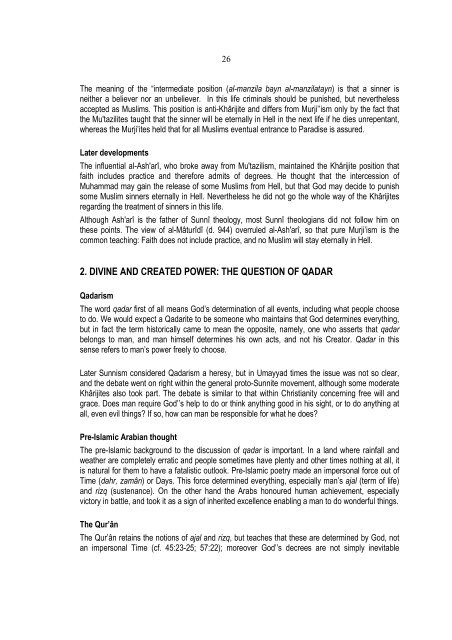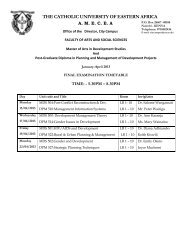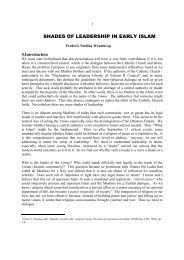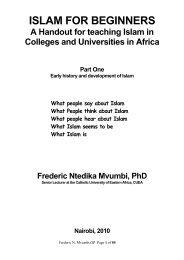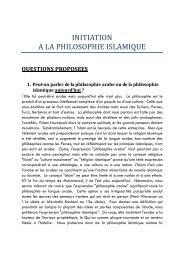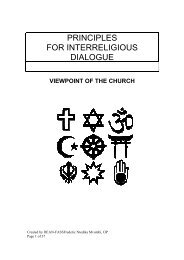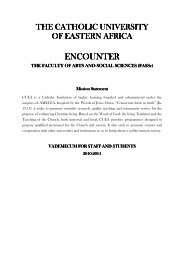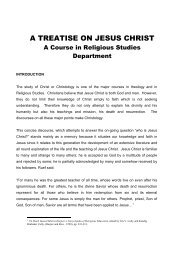26The meaning of the “intermediate position (al-manzila bayn al-manzilatayn) is that a sinner isneither a believer nor an unbeliever. In this life criminals should be punished, but neverthelessaccepted as Muslims. This position is anti-Khârijite and differs from Murji’’ism only by the fact thatthe Mu'tazilites taught that the sinner will be eternally in Hell in the next life if he dies unrepentant,whereas the Murji’ites held that for all Muslims eventual entrance to Paradise is assured.Later developmentsThe influential al-Ash'arî, who broke away from Mu'tazilism, maintained the Khârijite position thatfaith includes practice and therefore admits of degrees. He thought that the intercession ofMuhammad may gain the release of some Muslims from Hell, but that God may decide to punishsome Muslim sinners eternally in Hell. Nevertheless he did not go the whole way of the Khârijitesregarding the treatment of sinners in this life.Although Ash'arî is the father of Sunnî theology, most Sunnî theologians did not follow him onthese points. The view of al-Mâturîdî (d. 944) overruled al-Ash'arî, so that pure Murji’ism is thecommon teaching: Faith does not include practice, and no Muslim will stay eternally in Hell.2. DIVINE AND CREATED POWER: THE QUESTION OF QADARQadarismThe word qadar first of all means God’s determination of all events, including what people chooseto do. We would expect a Qadarite to be someone who maintains that God determines everything,but in fact the term historically came to mean the opposite, namely, one who asserts that qadarbelongs to man, and man himself determines his own acts, and not his Creator. Qadar in thissense refers to man’s power freely to choose.Later Sunnism considered Qadarism a heresy, but in Umayyad times the issue was not so clear,and the debate went on right within the general proto-Sunnite movement, although some moderateKhârijites also took part. The debate is similar to that within Christianity concerning free will andgrace. Does man require God’’s help to do or think anything good in his sight, or to do anything atall, even evil things? If so, how can man be responsible for what he does?Pre-Islamic Arabian thoughtThe pre-Islamic background to the discussion of qadar is important. In a land where rainfall andweather are completely erratic and people sometimes have plenty and other times nothing at all, itis natural for them to have a fatalistic outlook. Pre-Islamic poetry made an impersonal force out ofTime (dahr, zamân) or Days. This force determined everything, especially man’s ajal (term of life)and rizq (sustenance). On the other hand the Arabs honoured human achievement, especiallyvictory in battle, and took it as a sign of inherited excellence enabling a man to do wonderful things.The Qur’ânThe Qur’ân retains the notions of ajal and rizq, but teaches that these are determined by God, notan impersonal Time (cf. 45:23-25; 57:22); moreover God’’s decrees are not simply inevitable
27results of his omnipotence but also the execution of his designs of love and mercy for mankind. Inits teaching concerning judgement on the Last Day, the Qur’ân implies human responsibility. Thisteaching, however, must be reconciled with the teaching that God can forgive or punish sins as hewishes (cf. 2:284; 3:129; 4:43,116; 5:18,40) or forgive because of persons he has given permissionto intercede. Moreover God is said to “guide” (ahdâ) people or “lead them astray”(adalla) just ashe pleases (cf. 6:125; 16:93), and in the same way help them to succeed (nasara) or abandonthem (khadala). Other passages make God’’s guidance or leading astray dependent on people’sprevious good or evil actions (e.g. 2:26; 3:86).The Umayyad periodIn the Umayyad period the debate had political overtones. The Umayyad authorities favouredpredestinarian views in order to support their claim to divinely given authority. Their argument,especially as put forth by the poets Jarîr and al-Farazdaq, was that the Umayyads inherited thecaliphate from 'Uthmân as his blood-heirs. God decreed (qadâ) their authority and made them hisrepresentatives on earth. The Umayyads claimed to be the caliphs of God (khalîfat Allâh) and hisshadow on earth, in this way changing the word caliph from meaning “successor” (of Muhammad)to mean “deputy” as Adam was God’s deputy in Qur’ân 2:30, and David in 38:26; the Qur’ânspeaks of this generation as both God’s “deputy” on earth and “successor” of previous generations,6:165; 7:79,73; 10:14,73, 35:39). Everything the Umayyads did was therefore decreed by God andshould be accepted as such by their subjects. In this context Qadarites were considered opponentsof the regime, although in assessing their number we should be aware that the Umayyads tendedto brand any of their opponents as Qadarites, and later Sunnites tried to minimize the number ofUmayyad opponents who subscribed to Qadarism.The alleged founder of Qadarism is Ma'bad al-Juhanî, who took part in the rising of Ibn-al-Ash'athin 701 and was executed around 704; about all we know about him is that he had the reputation ofbeing the first to discuss the question of qadar. Another important man is Ghaylân ad-Dimashqî,who was a critic of the regimes of 'Umar ibn-'Abdal'azîz (717-20) and of Hishâm (724-3); he had toflee to Armenia, but was captured and executed. His followers, however, helped the reformistYazîd III to occupy the throne for a few months in 744. Ghaylân is reported to have combated thepopular opinion that evildoing is by God’s determination (qadâ wa-l-qadar). There were many moreproto-Sunnites of Qadarite sympathies, but later Sunnite reports give us few names and onlydescribe certain tendencies.One Qadarite tendency was to say that good actions are from God, but evil actions are from man.Al-Ash'arî tells a story making fun of a Qadarite named Maymûn: Maymûn had some money owedto him by Shu'ayb and demanded its repayment. Shu'ayb said to him, “I shall give it to you if Godwills.” Maymûûn said, “God has willed that you should give it to me now.” Shu'ayb said, “If God hadwilled it, I could not have done otherwise than give it to you.” Maymûn said, “God has willed whathe commanded; what he did not command he did not will, and what he did not will he did notcommand...” The dispute was then carried to Ibn-'Ajarrad, who was then in prison (from 723 to738), and he said in support of Maymûn, “We do not fix evil upon God.”Another tendency was to say that both good and evil actions are from man, yet through an ability(istatâ'a) or power (qudra) given to man by God.


